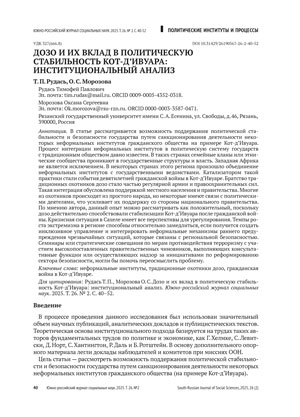Abstract
The article considers the possibility of maintaining political stability and security of the state by authorizing the activities of some informal institutions of civil society on the example of Côte d’Ivoire. The process of integrating informal institutions into the political system of states with traditional society has long been known. In such countries, family clans or ethnic communities infiltrate government structures and authorities. West Africa is no exception. In some countries of the region, informal institutions have been merged with government departments. The catalyst for this practice was the events of the nine-year civil war in Côte d’Ivoire. The brotherhood of traditional Dozo hunters became part of the regular army and law enforcement forces. This integration is due to the support of the local population and the Government. Many of the hunters come from the common people, but some have connections with political figures, which strengthens their support from the national government. According to the author, this experience can be considered as a positive one, since Dozo really contributed to the stabilization of Côte d’Ivoire after the civil war. The crisis situation in the Sahel has all the prospects for settlement. The growth rate of extremism in the region can slow down relatively if it is possible to create inclusive governance and integrate informal mechanisms for early warning of emergencies related to regional security. Seminars or strategic meetings on counterterrorism measures with senior government officials serving in advisory roles or overseeing security sector reform initiatives could help to rethink the issue.
Keywords
References
Глазкова, Е.С. (2019). Киргизия: институциональные изменения как выход из «ловушек развития». Южно-российский журнал социальных наук, 20(4), 49–62.
Даль, Р. (2000). О демократии. Москва: Аспект Пресс.
Какх, Ю. (1969). Нужна ли новая историческая наука? Вопросы истории, 3, 41–54.
Малиновский, Б. (2004). Аргонавты западной части Тихого океана. Москва: Российская политическая энциклопедия.
Мосейко, А.Н. (2022). Диалог в Африке. Его особенности и роль в процессе противодействия дестабилизации. В Сборник материалов конференции «Перспективы процессов дестабилизации в странах Африки» (с. 87–89). Москва: Издательство «Учитель».
Норт, Д. (1997). Институты, институциональные изменения и функционирование экономики. Москва: Фонд экономической книги «Начала».
Подкорытов, Г.А. (1988). О природе научного метода. Ленинград: ЛГУ.
Тафессе, К.З. (2022). Оправданы ли слова, к которым привык весь мир «диктаторы-людоеды», «этнические чистки», «кровавые бриллианты», «военные перевороты», применяемые в отношении африканских стран, к современной ситуации. В Сборник материалов конференции «Перспективы процессов дестабилизации в странах Африки» (с. 64–65). Москва: Издательство «Учитель».
Helmke G., Levitsky S. (2004). Informal Institutions and Comparative Politics. American Political Science Association, 4, 725–740.
Kisangani E.F., & F. Scott Bobb. (2010). Historical Dictionary of The Democratic Republic of The Congo. Scarecrow Press, Inc., 328.
Mead, M. (1935). Sex and Temperament in three Primitive Societies. Routledge & Kegan Paul London and Henly.
O’Donnell, G. (1994). Delegative Democracy. Journal of Democracy, 5, 55–69.
Sy, A. (2016). Foresight Africa: Top Priorities for the Continent in 2016. Africa Growth Initiative at Brookings, 47.


